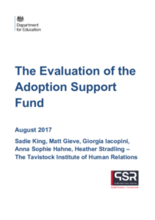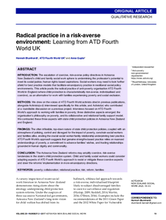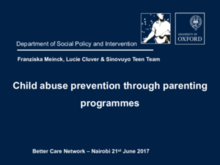Displaying 431 - 440 of 909
This report presents the findings of an evaluation of the UK's Adoption Support Fund undertaken by the Tavistock Institute of Human Relations.
This report is a case study of the Child Wellbeing Project, which sought to address the reduction of services to families post-care compared to available in-care services to prevent foster care re-entry, ensure permanence, and improve long-term outcomes for children.
This report examines and shares learnings from ATD Fourth World UK's social work practice framework with families experiencing poverty, discussing its strengths-based collaborative approach to build relationships and reduce power imbalances between practitioners and families. Implications for the feasibility of implementing this framework in child protection social work practice and policy in Aotearoa New Zealand is also addressed.
This study observes foster care re-entry for young people whose families participated in Cottage Housing Incorporated's Serna Village Program (CHI), a supportive housing program serving homeless families in Sacramento, California.
This study measured the effectiveness of a Positive Parenting and Sensitive Discipline program for mothers and their 10- to 36-month-old children placed in parental residential care.
This qualitative study, embedded in a randomised trial of the Group Family Nurse Partnership (gFNP) program, was designed to explore the challenges faced by women with experience in the care system during pregnancy and early parenthood and to assess the potential of gFNP to meet their needs through the perspectives of a range of informants.
The 2017 Home Visiting Yearbook presents, for the first time, the most comprehensive picture available of home visiting on the national and state levels, revealing the breadth of home visiting in the United States and identifying the gaps in practice.
This presentation describes the process, key findings, and recommendations from the Sinovuyo Teen Study, a project of the World Health Organisation's Parenting for Lifelong Health.
In this video message, Marta Santos Pais, SRSG on Violence against Children, addresses the June 2017 Africa Expert Consultation on Violence against Children (VAC) in All Care Settings.
This article examines the impact of poverty on looked-after children and their families, describes and evaluates the use of multiple family group therapy and other family-based interventions, and reports children's experiences and feedback from the groups.






